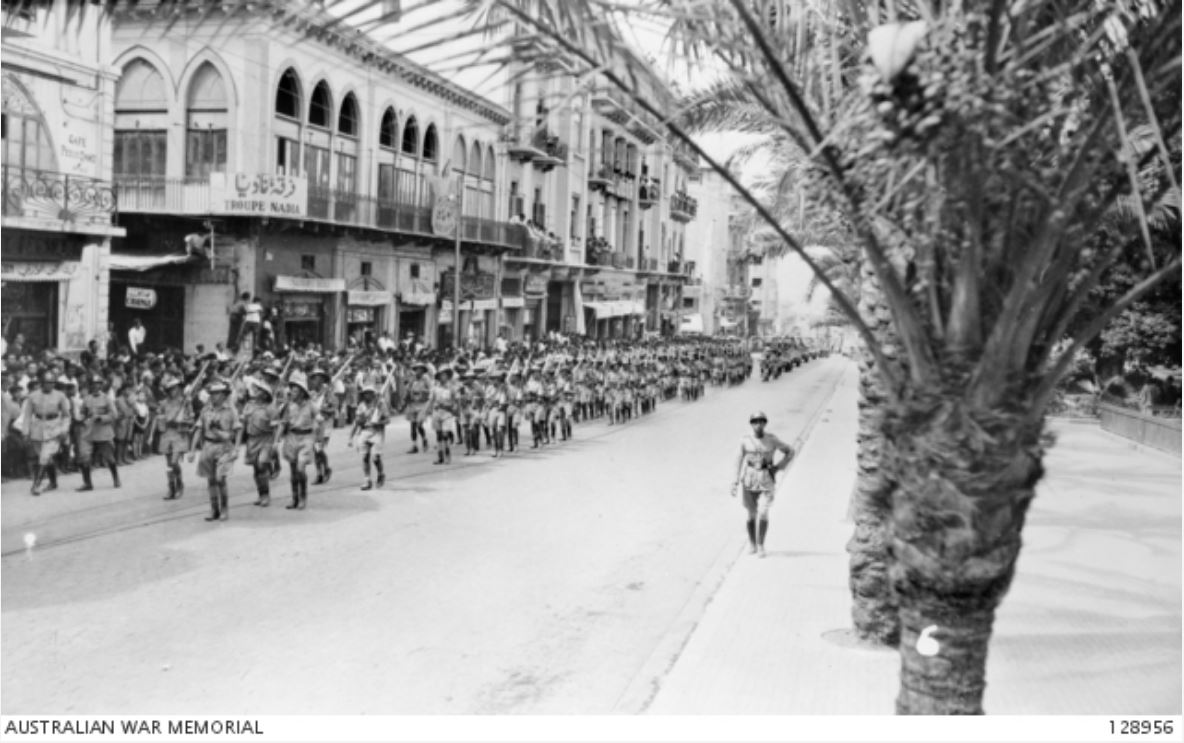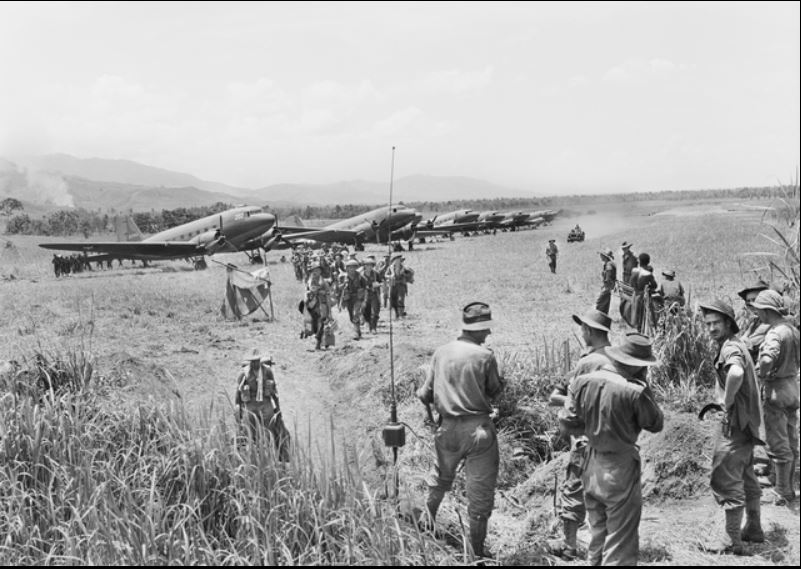Difference between revisions of "2/16th Australian Infantry Battalion"
From Our Contribution
(→Battalion Personnel) |
(→Battalion Personnel) |
||
| Line 34: | Line 34: | ||
===Battalion Personnel=== | ===Battalion Personnel=== | ||
* [[Eric Anderson]] May 1940 - 6 Sep 1944 | * [[Eric Anderson]] May 1940 - 6 Sep 1944 | ||
| + | * [[Edwin Reed Marshall]] 17 Jun 1940 - 7 Nov 1945 | ||
* † [[Victor Charles Lowe]] 18 Jun 1940 - 8 Sep 1942 | * † [[Victor Charles Lowe]] 18 Jun 1940 - 8 Sep 1942 | ||
* [[Edward Arthur Sewell]] 20 May - 25 Jul 1941 | * [[Edward Arthur Sewell]] 20 May - 25 Jul 1941 | ||
| Line 47: | Line 48: | ||
* † [[Jack North]] ?? - 31 Dec 1942 | * † [[Jack North]] ?? - 31 Dec 1942 | ||
| − | |||
* [[Allan Cole Uren]] | * [[Allan Cole Uren]] | ||
* [[John Patrick Whitaker]] | * [[John Patrick Whitaker]] | ||
Revision as of 01:13, 15 November 2022
 Ceremonial entry into Beirut, Lebanon by 2/16th Battalion AWM - 1 28956 | |
 2/16th personnel arrive at Kaiapit by air. | |
Contents
Brief History
Formed in Perth on 20 Apr 1940 the battalion began basic training at Northam Camp. On 25 Oct 1940 the battalion embarked on the HMT Aquitania for overseas in Gage Roads Fremantle, arriving in Bombay, India on 4 Nov 1940. Here they disembarked and moved to Deolali to await a ship to transfer them to Egypt. On 10 Nov 1940 they boarded HMT Rajula and sailed the next day, arriving in El Kantara where they disembarked on 25 Nov 1940. The battalion was then sent by train to Al Majdal in Palestine to complete its training.
In April and May 1941 it was a part of the defence along the Egypt-Libya border against an expected German attack. Moving back to Palestine, it prepared to take part in the attack against French Vichy forces in the Lebanon and Syria commencing 8 Jun 1941. During this six week campaign against well entrenched troops the battalion suffered 264 casualties, especially when they crossed the Litani River on 9 June; their unsuccessful attack on Sidon on 13 June; and during their seizure of El Atiqa Ridge on 6 July. With the armistice, the 2/16th Battalion remained in Lebanon for a time as Garrison troops.
With the entry of Japan in the war, troops were required at home and the 2/16th, along with the rest of the 21st Brigade were the first to return. Boarding the SS Île de France in Port Tewfik. Seven days later they disembarked in Bombay and then boarded the SS Kosciusko. Intended for Java, the rapid advance of Japanese troops brought about a change of plans and eventually the convoy that they were part of sailed for Adelaide with Western Australian members disembarking in Fremantle on 15 Mar 1942. Here due to confusion, 350 men were left behind (AWOL) when the ship sailed for Adelaide.
At the time the battalion was gathering in Adelaide, the Militia units in Papua New Guinea were being forced back down the Kokoda Track. So, on 6 Aug 1942 the battalion boarded the SS James Fenimore Cooper for Port Moresby in New Guinea, disembarking there on the 13th after which they were rushed to assist the defence on the Kokoda track. By 29 Aug 1942 they were in action against the Japanese at Abuari. Forced to retreat they fought a series for fighting withdrawals back along the track, suffering their heaviest casualties when the fought their way out of a Japanese encirclement at Mission Ridge. Relieved at Imita Ridge, it was now so short of fighting troops that it was amalgamated with the 2/14th Battalion in order to once again be able to enter the battle. Following a short rest the 2/16th Battalion was once again a separate battalion, but when they re-entered the battle at Gona on 26 Nov 1942 it could only muster two rifle companies. When they were next relieved on 7 Jan 1943 the battalion had only 56 fit troops.
The battalion returned to Australia in January to rebuild, and having done so was sent back to Papua in early August 1943 where it spent a month training in the Port Moresby area. They were then sent to Lae where they played a minor role in operations before being airlifted to Kiapit. From here they advanced up the Ramu valley, conducting patrols and minor fights with their major action the capture of Shaggy Ridge against fierce Japanese opposition between 27 and 28 Dec 1943. Returned to Port Moresby on 4 Jan 1944, they were again sent back to Australia for leave and rebuilding on 20 Mar 1944.
On 3 Jun 1945 the battalion again departed Australia, this time to participate in the landing at Balikpapan on 1 July. Following the landing they undertook patrols until the end of the war on 15 Aug 1945. In mid October the battalion relocated to the Celebes where they formed part of the occupation force. On 2 Feb 1946 the battalion embarked on SS Winchester Victory for Brisbane where it was disbanded in late February 1946. Two hundred and fifty eight of its members died during the war, and eight others were either captured or missing in action during operations in the Pacific theatre.
Battalion Personnel
- Eric Anderson May 1940 - 6 Sep 1944
- Edwin Reed Marshall 17 Jun 1940 - 7 Nov 1945
- † Victor Charles Lowe 18 Jun 1940 - 8 Sep 1942
- Edward Arthur Sewell 20 May - 25 Jul 1941
- James Henry Clarke 23 Jun 1940 - 24 Jun 1942
- Clarence Malarkey 16 Sep 1940 - 31 May 1943
- Francis Malarkey 25 Oct 1940 - Sep 1943
- Len Malarkey 25 Jun 1941 - 30 Nov 1945
- David Edward Kitchener Granberg 5 Jul 1941 - 3 Dec 1942
- John William Pryor 19 Jan - 12 Sep 1942
- Jack David Bunney 2 Oct 1944 - 13 Feb 1946
- Frederick Haughton Dawson 18 Jun - 31 Nov 1945
- † Jack North ?? - 31 Dec 1942
Battle Honours
- Balikpapan
- Borneo 1945
- Buna-Gona
- Damour
- Efogi-Menari
- Eora Creek-Templeton's Crossing I
- Gona
- Ioribaiwa
- Isurava
- Kokoda Trail
- Ramu Valley
- Shaggy Ridge
- Syria 1941
- Syrian Frontier
- The Litani
- Wadi Zeini
Individual Honours
- 3 x Distinguished Service Orders
- 1 x Member of the British Empire
- 6 x Military Cross & 2 bars
- 5 x Distinguished Conduct Medal
- 20 x Military Medal & 1 bar
- 63 x Mentioned in Despatches
Notes
Content for the history and honours sections has come from a combination of Wikipedia and the Australian War Memorial websites. 3,275 men served in the battalion, and of these 671 were casualties - 223 KIA or died from wounds accident or disease.
